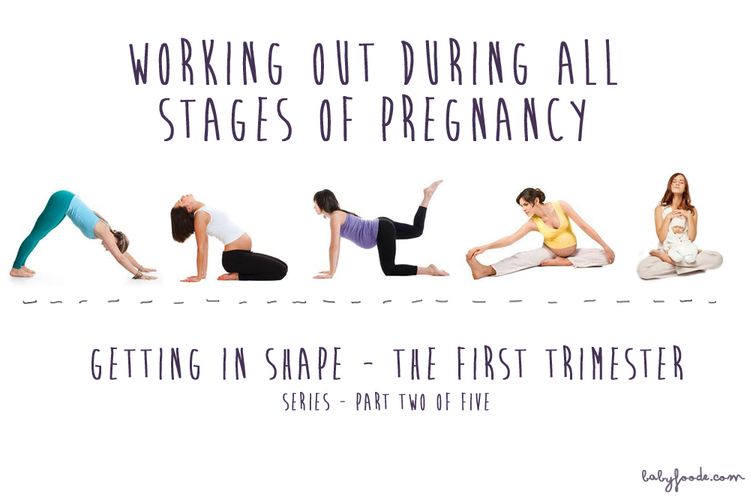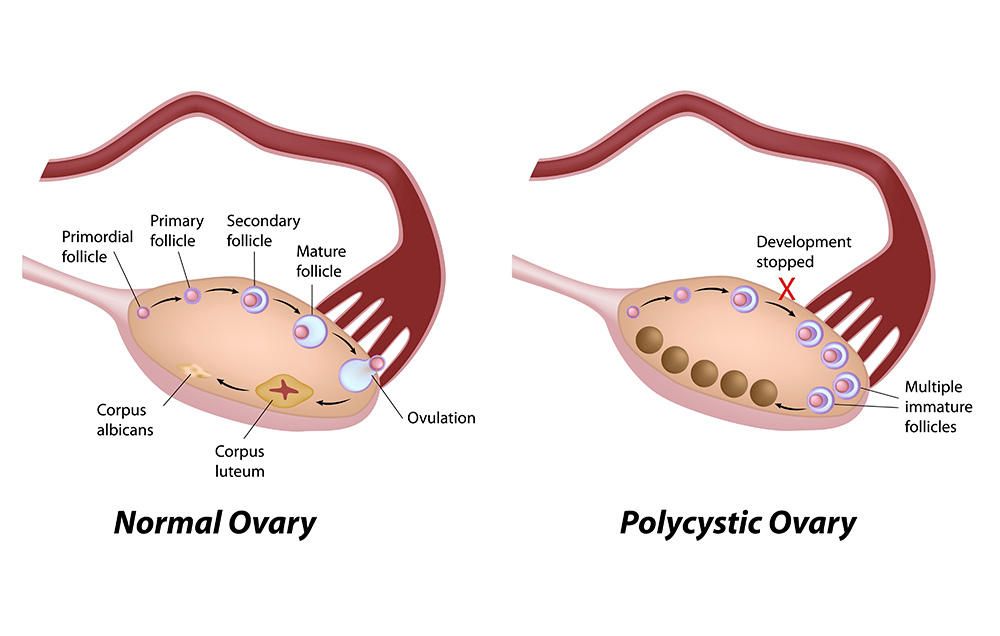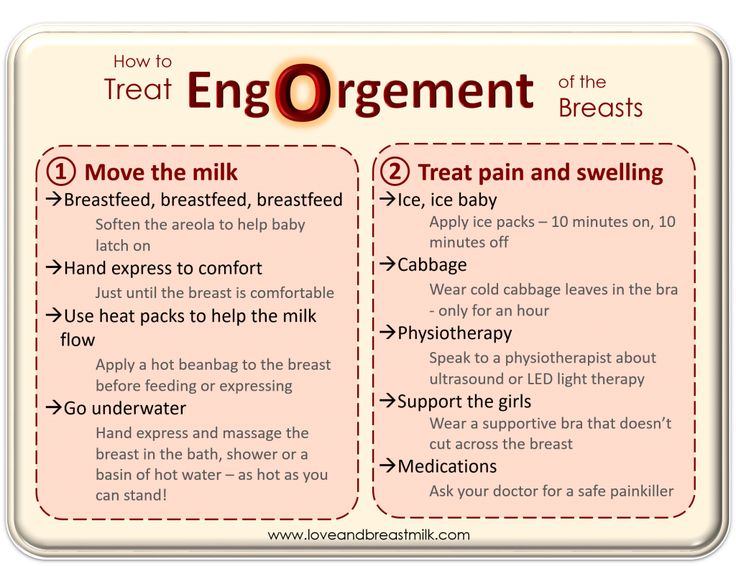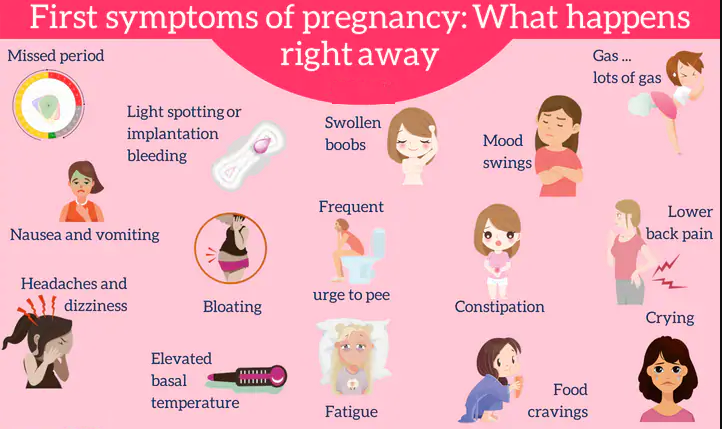Tired 3rd trimester
Fatigue During Pregnancy
Fatigue during pregnancy is very common. Some women may feel exhausted throughout their pregnancy, while some may hardly feel tired at all. Although experience with fatigue tends to vary, most women will feel more tired than usual during their pregnancy. Fatigue during pregnancy is most common during the first trimester. It tends to go away during the second trimester, but will usually return in the third trimester.
First Trimester Fatigue
During early pregnancy, hormonal changes are likely the cause of fatigue. Your body is producing more blood to carry nutrients to your growing baby. Your blood sugar levels and blood pressure are also lower. Hormones especially increased progesterone levels, are responsible for making you sleepy. In addition to the physical changes occurring in your body, emotional changes can contribute to decreased energy.
Whether the pregnancy is planned or unplanned, you may experience anxiety about motherhood, worry about the baby’s health, or even experience conflicting feelings about your pregnancy. It is important to understand that your emotions do play a part in how you feel physically, and all of these things are a natural and normal part of pregnancy.
Second Trimester Fatigue
During your second trimester, there is a good chance your energy level will increase and you will start to feel more like your old self. Many women take advantage of this time during the pregnancy to accomplish important tasks, as energy levels will likely decrease again in the third trimester. This is often called “The Happy Trimester.” Now don’t be alarmed if during this trimester you still experience fatigue. More than likely it will be less obvious, but unfortunately, fatigue during pregnancy is still possible during the second trimester.
Third Trimester Fatigue
In late pregnancy, you will most likely begin to feel tired again. At this point you will be carrying extra weight from the baby, maybe having trouble sleeping, and dealing with frequent urination more often. The following are a list of ways to cope with the fatigue you may be experiencing.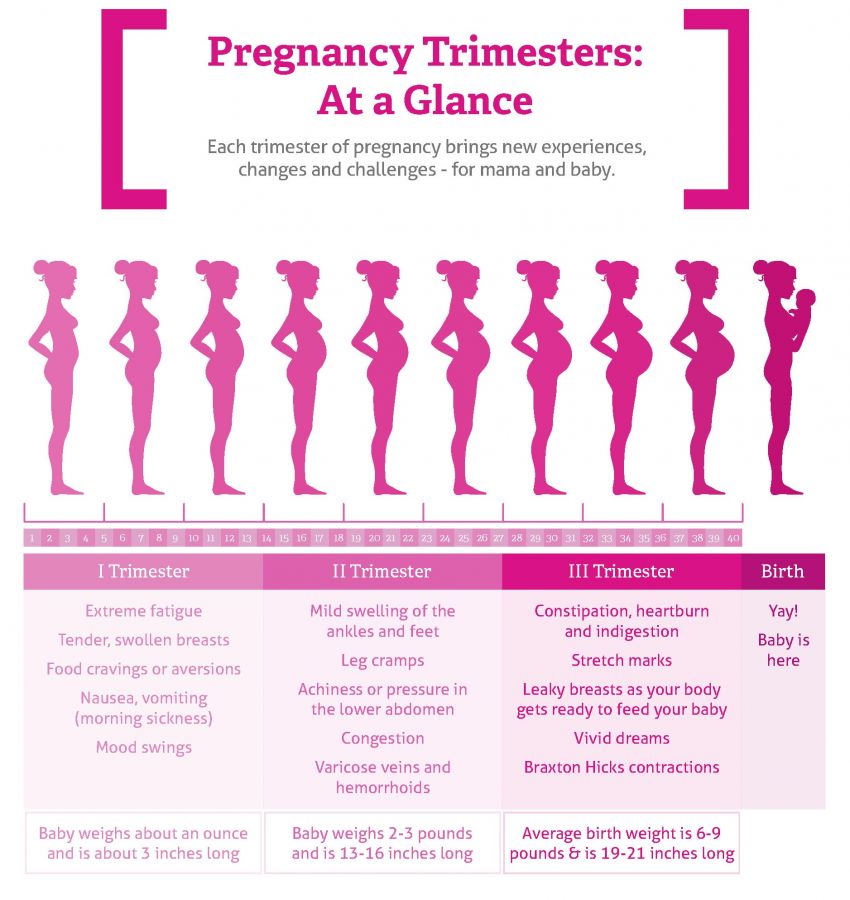
Coping Steps for Fatigue During Pregnancy
- Rest– Make sure you allow yourself to get extra bed rest during the times you feel fatigued. This can be accomplished by going to bed earlier or taking a nap during the day, if possible. Avoiding fluids several hours before bed is also a good way to cut down on the number of times you have to get up at night to use the bathroom.
- Adjust Schedule – If your current commitments or activities prove to be too draining during pregnancy, you may have to temporarily adjust your schedule to be less busy. This can include cutting back your hours at work, if possible, or asking friends and family to assist you with housework/errands.
- Eat a Balanced Diet– Eating nutritious meals will go a long way toward supporting your energy levels. Make sure you get enough iron, protein, and calories. Fatigue can become worse if you are not getting the proper nutrients. Also, you will need to ensure you stay hydrated during your pregnancy.

- Moderate Exercise – Although you may feel like you do not have the energy to exercise, if you incorporate moderate activity, such as a 30-minute walk, this will actually make you feel more energized. Exercise is beneficial in pregnancy unless your healthcare provider has advised otherwise.
Compiled using information from the following sources:
Roger W. Harms, M.D., E.-I.-C. Mayo Clinic: Guide to a healthy pregnancy. USA: American Academy of Pediatrics.
The Most Tired You've Ever Felt
Growing a human is exhausting. It’s as if a magical spell was cast the day your pregnancy test came back positive — except Sleeping Beauty’s fairy didn’t gift you with 100 years of rest and true love’s kiss is what got you into this.
If only you could sleep more…
It’s completely normal for a pregnant woman to feel fatigued, especially during the first and third trimesters.
Somewhere between morning sickness and elastic waistbands, Little Bo-Peep has lost your sheep (she probably sold them to Sleeping Beauty) and there are none left for you to count to sleep.
One of the first signs of pregnancy is fatigue. It smacks you by surprise, like the sliding glass door you assumed to be open.
Beginning as early as conception and implantation, pregnancy hormones instantly affect your body, mood, metabolism, brain, physical appearance, and sleep pattern.
In the second trimester, which begins at week 13, many women get a fresh surge of energy. This is a great time to tackle those important before-baby-arrives chores, because as you enter the third trimester, which begins at week 28, that extreme exhaustion returns.
Simply put, you feel tired because you’re growing a baby.
In addition to hormonal changes, physical and emotional changes also lower your energy levels and make you feel fatigued.
Some of these changes include:
- increased levels of estrogen and progesterone (which, by the way, acts as a natural sedative)
- lower blood pressure and blood sugar
- increased blood flow
- disrupted sleep
- digestion issues
- morning sickness
- stress and anxiety
- frequent urination
- heartburn
- back, hip, and pelvic pain
When to contact your doctor or midwife
If insomnia, restless legs syndrome (the uncontrollable urge to move your legs while resting), sleep apnea (a potentially serious disorder in which breathing repeatedly stops and starts), preeclampsia, or any other condition is hindering your sleep, talk to your doctor or midwife during your next appointment.
Other reasons to contact your doctor or midwife include, if you:
- feel concerned that the pregnancy fatigue is a sign of something more, like anemia, gestational diabetes, or depression
- develop any changes in your vision
- experience dizziness
- urinate less frequently
- have shortness of breath, pain in your upper abdomen, or heart palpitations
- experience severe headaches
- notice a swelling of your hands, ankles, and feet
Your healthcare practitioner can help you uncover any problems and offer additional solutions.
Growing a baby obviously takes a toll on your body. Don’t ignore the signals your body is sending you. Reach out to others if you’re struggling to sleep throughout your pregnancy. Ask for help from your partner.
No matter how tired you get, you should avoid taking any over-the-counter medicines as a sleeping aid.
Most pregnant women should spend at least 8 hours in bed, aiming for at least 7 hours of sleep every night. If possible, try going to sleep a little earlier than usual.
If possible, try going to sleep a little earlier than usual.
As your body changes, make sleep a priority and follow these tips to combat pregnancy fatigue:
Keep your bedroom dark, clean, and cold
Create the right atmosphere for optimal rest.
In order for your body to reach deep sleep, cover any windows with blackout curtains. Turn off any digital clocks and unplug nightlights illuminating a glow (cover the display with electrical tape if you don’t want to completely turn the device off).
Set the bedroom temperature a little cooler than the rest of your home, for optimal quality of sleep. Eliminate any needless clutter and wash your bedsheets often. Save your bed for sleep, cuddling, and sex.
Take a nap
Napping can make up for any sleep lost at night, due to frequent trips to the bathroom, body aches, and every other pregnancy irritation. Avoid napping in the late afternoon and early evenings.
If your employer frowns upon nap time, find a good spot in the breakroom and put your feet up while you eat lunch.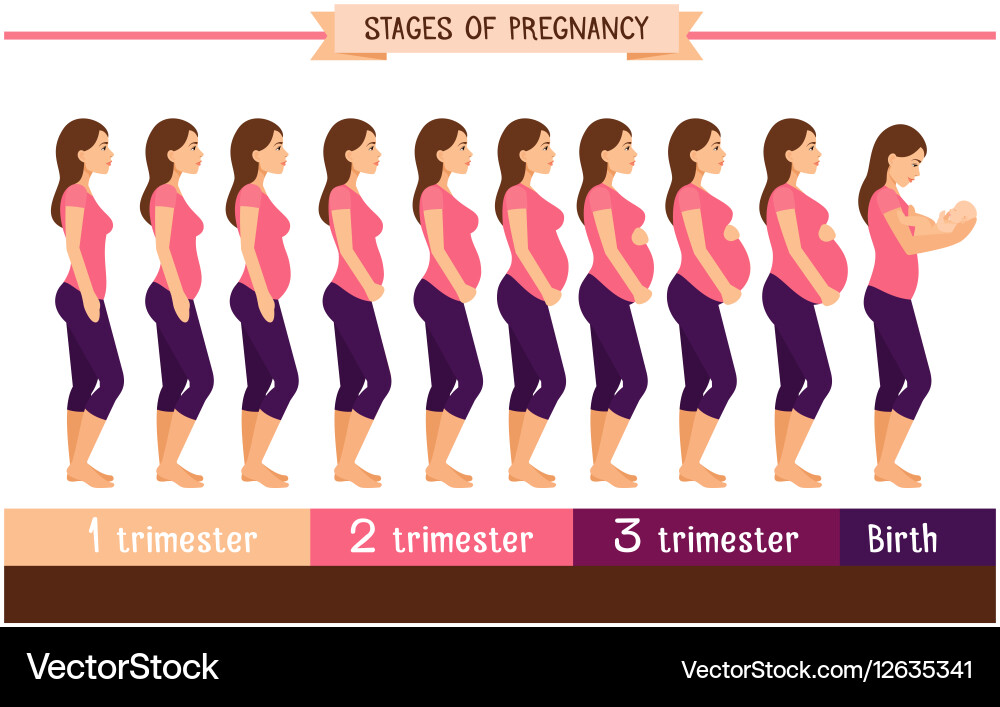
Eat healthy meals and stay hydrated
In the beginning, pregnancy can also lower your blood pressure and blood sugar, which can make you feel tired. But a lack of sleep can cause your blood sugar levels to rise, increasing the risk for gestational diabetes.
Keep your blood sugar and energy levels balanced by eating often, such as six small meals a day. Frequent meals that are high in nutrients and protein help to combat fatigue.
To avoid nighttime leg cramps, stay hydrated by drinking enough water and fluids throughout the day.
Keep a pregnancy journal or dream diary
Keep a journal throughout your pregnancy. If you’re feeling anxious or stressed, try writing in it.
Pregnant women experience more vivid dreams and better dream recall, due to hormonal shifts affecting sleep patterns, increased fatigue, and repeatedly waking in the middle of a sleep cycle.
Sleep diaries can also be enlightening, providing concrete data about your bedtime, how long it takes for you to fall asleep, nighttime awakenings, awake time, and sleep quality.
Avoid caffeine after lunchtime
As far as stimulants go, caffeine may keep you awake long into the night or cause you to wake more frequently. It can also keep your baby active, kicking and rolling around inside your belly as you try to sleep.
Experts recommend pregnant women limit their caffeine intake to two home-brewed cups of coffee, or less than 200 milligrams, per day.
Pamper yourself
Ask for help from family and friends. Take a warm bath. Ask your partner for a massage. Take a break.
Wear soft, non-restrictive clothing and sit in a cozy chair with a good book and read for a little bit. Light a lavender candle. Play soothing instrumental music. Have a cup of warm chamomile tea.
You get it.
Exercise
The demands of pregnancy together with the weight gained puts an enormous amount of pressure on your body.
In addition to more restful sleep, The American College of Obstetricians and Gynecologists states the following benefits of exercise during pregnancy:
- reduced back pain
- eased constipation
- decreased risk of gestational diabetes, preeclampsia, and cesarean delivery
- healthier weight gain during pregnancy
- improved overall general fitness
- strengthened heart and blood vessels
- improved ability to lose the baby weight after your baby is born
It can take a few hours for your body to fully wind down after energetic workouts, so plan for any physical activity to take place earlier in the day.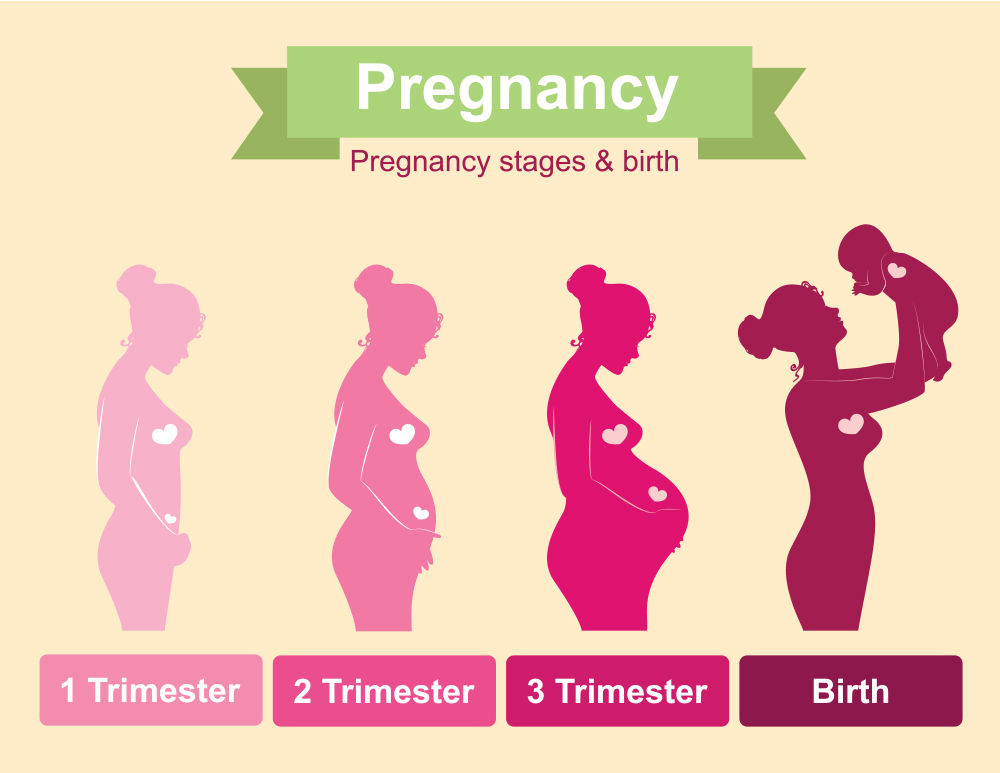 If the exercise is light, like yoga, it’s unlikely to interfere with your sleep.
If the exercise is light, like yoga, it’s unlikely to interfere with your sleep.
Always check with your medical practitioner or midwife before beginning a new exercise program during pregnancy.
Pregnancy can be a tiring experience — both emotionally and physically. It’s important to remember: You are not alone.
Nearly all women experience more fatigue than usual at some point during their pregnancy. Take it as a message from your body. It’s telling you to rest, and you should definitely listen.
Third trimester of pregnancy (from 28 to 40 weeks)
At 30 weeks pregnant, you are ready to go on maternity leave. In the case of twins, prenatal leave is from 28 weeks. Active work, physical and mental overload during this period can provoke premature birth.
It's time to put on the bandage - it will help your baby stay in the right position and you in good shape after childbirth.
The child still needs a lot of nutrients, vitamins, mineral salts. Use your vacation to relax, but don't lie around all day. We hope that hiking in the fresh air has become a habit for you. nine0003
Use your vacation to relax, but don't lie around all day. We hope that hiking in the fresh air has become a habit for you. nine0003
Do not forget to keep track of the ratio of drunk and excreted liquids. Accumulating in the body, the fluid disrupts the functioning of the kidneys, increases the load on the heart, which causes an increase in blood pressure. As a result, the child suffers: he lacks nutrients, oxygen.
A sharp headache, flashing flies before the eyes, convulsions are signs of eclampsia, a severe complication of pregnancy that poses a threat to the life of the mother and child. Urgently call the ambulance. nine0003
At this time, the uterus becomes very sensitive to the pushes and movements of the child, its muscles periodically tighten. It's like she's doing gymnastics. If this rarely happens and you do not feel pain, then everything is in order and there is no cause for concern. But if the uterus tenses often, pain appears - call an ambulance. If spotting appears, amniotic fluid is pouring out, do not wait for contractions - immediately to the hospital!
Sex life from 32-33 weeks is not recommended. nine0003
nine0003
At 32 weeks, another scheduled ultrasound examination is scheduled to assess the correct functioning of the placenta, if necessary, the study of fetal heart sounds.
The last month is the most difficult. The load on the body has increased to the maximum. You are already tired of the long wait. Approximately two weeks before delivery, a mucous plug will come off the cervix, which is a lump, sometimes slightly stained with blood.
Do not forget to make up for the lack of calcium in the body - until the last day of intrauterine existence, the child intensively stores minerals. Eat fully and properly - the fetus eagerly takes everything valuable for the formation of the body. He needs protein now. Be sure to take a prenatal multivitamin. Rest during the day. Lie on your side, slightly raise your legs. nine0003
Many women suffer from constipation at this time. Only a rational diet will help. Eliminate grapes, fresh cabbage, peas and other legumes, fresh milk, muffins, sweets.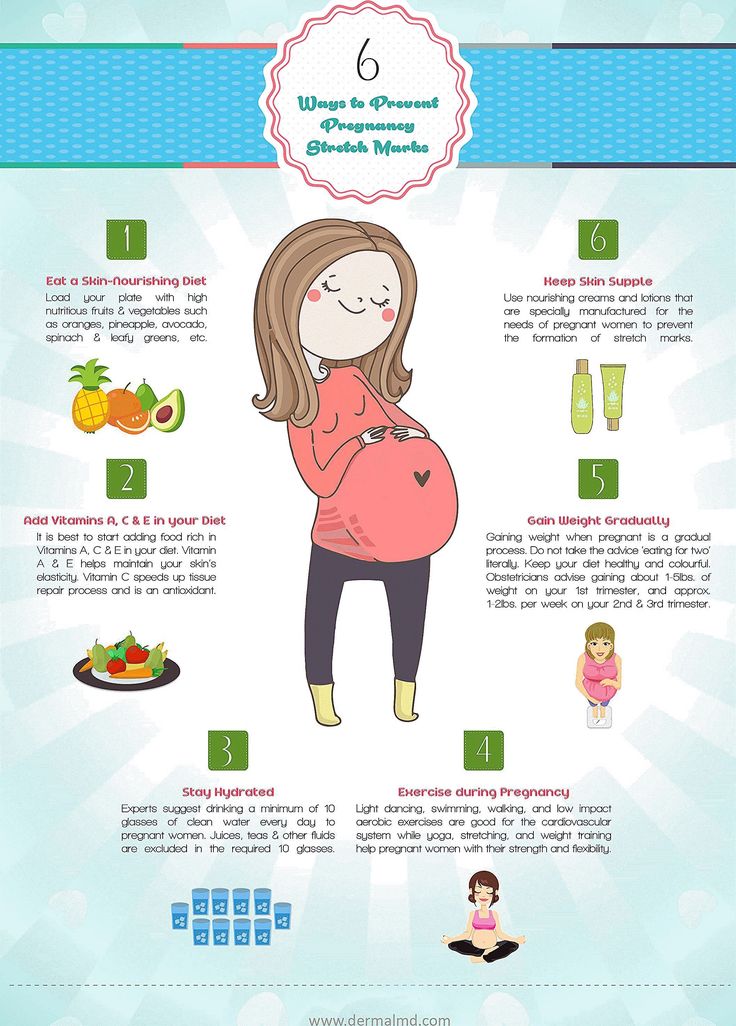 Useful: curdled milk, fermented baked milk, kefir. Steamed dried fruits normalize bowel function well. Don't take laxatives. In the last trimester of pregnancy, they can provoke uterine contractions and cause premature birth.
Useful: curdled milk, fermented baked milk, kefir. Steamed dried fruits normalize bowel function well. Don't take laxatives. In the last trimester of pregnancy, they can provoke uterine contractions and cause premature birth.
Sometimes, if the fetus is very large, the navel turns outward. Don't be scared and don't try to push it back. After giving birth, everything will return to normal. nine0003
By the last weeks of pregnancy, the mammary glands are greatly enlarged. The appearance of colostrum is another harbinger of close childbirth. The bra should be tight, with wide straps, always cotton.
Be prepared for contractions to start at any moment. Trim your fingernails and toenails short, and shave your pubic hair. Prepare things for the newborn and for yourself. Show your husband or relatives where they lie. An exchange card, passport, insurance policy, birth certificate should always be with you. nine0003
Think that you have to help your child come into the world. Everything will be ok!
Everything will be ok!
Fatigue during pregnancy
During pregnancy, a woman gets tired faster than usual, sometimes without even doing anything special. This is normal, because hormonal and psychological changes take place, and the body prepares for childbirth. Such changes can be stressful for a woman, which adds to the feeling of fatigue.
A pregnant woman develops insomnia, heartburn, heaviness in the back, spasms and cramps in the legs, and excessive fatigue may indicate anemia, especially if symptoms such as pale skin, shortness of breath, dizziness and palpitations are present. Iron deficiency in pregnant women occurs very often, as the need for iron increases due to the needs of the baby, and the hemoglobin produced by iron delivers oxygen not only to the tissues of the mother, but also to the child. nine0003
1. Proper nutrition
Nutrition of a pregnant woman should be BALANCED. Be sure to have a large amount of vitamins and minerals, especially iron and protein. A large amount of iron is found in the following foods: red meat, seafood, poultry, legumes. When consuming iron-rich foods, try to drink freshly squeezed citrus juices, which will help your body absorb minerals better. Do not forget about special multivitamin complexes for pregnant women. nine0003
A large amount of iron is found in the following foods: red meat, seafood, poultry, legumes. When consuming iron-rich foods, try to drink freshly squeezed citrus juices, which will help your body absorb minerals better. Do not forget about special multivitamin complexes for pregnant women. nine0003
2. Drink more fluids
Lack of fluid in the body leads to rapid fatigue, but do not overdo it in the third trimester when there is a tendency to edema, especially before bedtime.
3. Exercise
If there are no contraindications and your doctor has no objection, then try to exercise regularly. It will help to relax not only your body, but also charge you with positive. It is not necessary that this be a daily set of exercises, hiking in the fresh air is enough. nine0003
4. Help from loved ones
Do not refuse help, the care of your loved ones will be very necessary for you during this period. Not only do not refuse, but also ask for help yourself when you need it.
Not only do not refuse, but also ask for help yourself when you need it.
5. Rest
Relax more, try to spend a lot of time doing activities that give you pleasure and satisfaction and avoid stressful situations. Use special breathing techniques to relax. Rest more time, use every opportunity that falls to lie down to rest. If you are busy with work, be sure to take breaks, restore strength. nine0003
6. Third trimester
As for the third trimester of pregnancy, here, among other difficulties, there may be HEAVY AND FEELING OF TENSION IN THE lumbar. The baby has already grown up and gained weight, so long walks are becoming harder and harder. In such cases, prenatal bandages can be used to relieve heaviness in the back.
But the SPECIAL BANDAGE may not suit all women. Many cannot choose the right and suitable option for themselves, because it can put pressure and create discomfort. 9 will help you in this situation. 0039 sling scarf . You can tie up your stomach with them, and it will not squeeze the child, creating inconvenience, but will provide support for both the tummy and lower back.
0039 sling scarf . You can tie up your stomach with them, and it will not squeeze the child, creating inconvenience, but will provide support for both the tummy and lower back.
Many expectant mothers who have tried SLING AS A BANDAGE noted that it is really more comfortable and pleasant than a special bandage. After childbirth, the sling will come in handy not only for carrying the baby, but also for tying up the pelvis and abdomen, which will help the uterus contract faster. Often, the bandage simply tamps down the lowered organs and flattens the stomach, while tying it with a sling will just lift and “put in place” the organs and fix the stomach. nine0003
For information: in Mexico, for example, SLING, or rebozo, IS AN ESSENTIAL TOOL FOR MIDWIVES. Rebozo is used there not only for carrying children or as a part of the national costume, but also as an assistant to a pregnant woman. So, for example, in addition to supporting the abdomen and lower back, a midwife can use it to make a special relaxing massage for a woman in labor and even change the position of the child in the womb with special techniques and exercises.